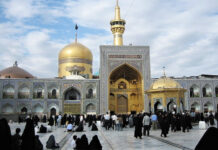The brutal threats against Uyghurs and other Turkic Muslims in Xinjiang uttered by Xi Jinping during his visit to Urumqi on August 26 have been negatively received all over the world. Official pictures show standing close to Xi the secretary of the all-powerful CCP Central Political and Legal Affairs Commission, Chen Wenqing. His position makes Chen, a Politburo member and former Minister of State Security, the de facto chief of all public security in China.
Less commented nationally and internationally is that Chen arrived in Urumqi from Hezuo City, in Gannan Tibetan Autonomous Prefecture, part of Gansu, province. Before going to Xinjiang, Chen had in fact inspected Gansu, and his last stop had been Hezuo City.
Gannan Tibetan Autonomous Prefecture is home to more than 400,000 Tibetans, who represent 57% of the populations, a testament to the fact that historical Tibet is a larger country than what China decided to call Tibet Autonomous Region and now Xizang.
Chen told Gannan Prefecture authorities that Beijing expects from them that they “create a safe and stable social environment for promoting Chinese-style modernization,” uphold “scientific culture,” and fight against “separatism” and “superstitions.”

Anticipating Xi’s speeches in Urumqi, Chen indicated Xinjiang as a model for the fight against “separatism” and the use of religion to criticize the CCP. As Xi would later do in Xinjiang, Chen hailed the example of the “Fengqiao experience.” As “Bitter Winter” has repeatedly explained, “the Fengqiao movement was launched in Zhejiang province by Chairman Mao in 1963 as a prelude to the Cultural Revolution. It consisted of the ‘four cleanups’ in which four groups of ‘reactionary elements’—‘landlords,’ ‘wealthy peasants,’ ‘counterrevolutionaries’,and ‘evildoers’—were detained, publicly humiliated, tortured, and in some cases killed ‘Counterrevolutionaries’ and ‘evildoers’ included those who still adhered to independent forms of religion.”
The substance of Chen’s remarks is that the same persecution vested on Muslim Uyghurs in Xinjiang should target Tibetan Buddhists in Gansu. And not only them. Chen also visited Gansu’s Linxia Hui Autonomous Prefecture, whose population consists for more than 50% of minorities, including both Tibetans and Hui Muslims. Chen warned against those resisting “Sinicization of Islam,” meaning those who had opposed in the Prefecture and nearby areas of Gansu the vandalization of Hui mosques under pretext of “Sinicization.” — Bitter Winter






